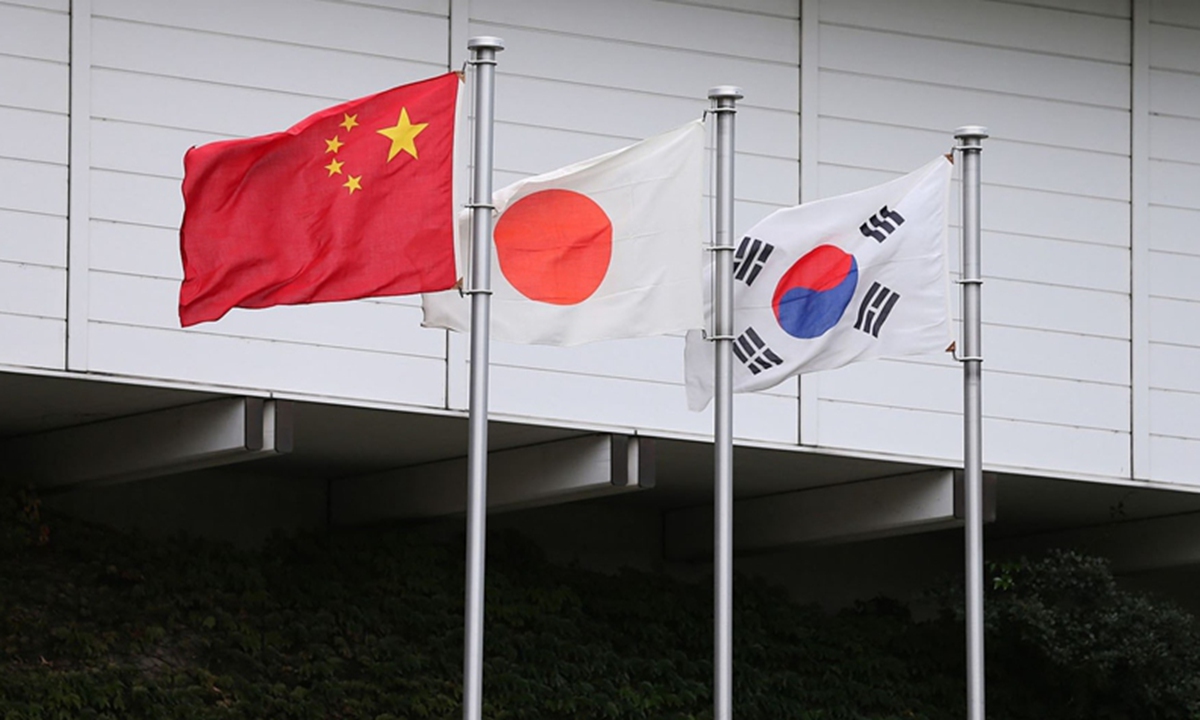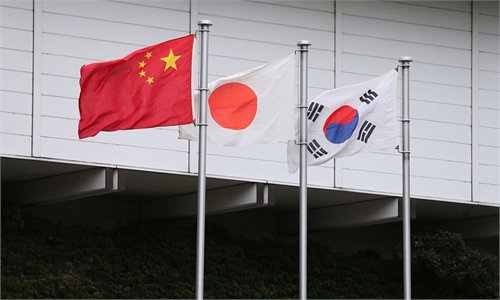China, S.Korea, Japan to resume FTA negotiations; Premier Li calls for upholding spirit of ‘strategic autonomy’

China Japan South Korea File photo:CGTN
Chinese Premier Li Qiang said on Monday at a trilateral meeting with leaders of Japan and South Korea which was held in Seoul, South Korea, that the three countries should stay committed to the original aspiration for cooperation and make joint efforts to resume and accelerate China-Japan-South Korea cooperation so as to make greater contributions to regional prosperity and stability.
Li made the remarks at the ninth Trilateral Summit Meeting among China, Japan and South Korea, where Japanese Prime Minister Fumio Kishida and South Korean President Yoon Suk-yeol attended, the Xinhua News Agency reported.
Chinese analysts said the three major economies in East Asia are trying to resume the trilateral cooperation from the fields of economy, trade and cultural exchanges where the three countries share broad common interests and similarities, while lay aside the difference in other tough topics including historic and sovereignty issues, as well as ideological differences.
Li also said at the meeting that the three countries should regard each other as partners and opportunities for development, and uphold economic globalization and free trade.
South Korean media Yonhap News Agency reported on Monday that the trilateral session discussed ways to promote cooperation in six specific areas - economy and trade, sustainable development, health issues, science and technology, disaster and safety management, and people-to-people exchanges.
The leaders also agreed to institutionalize the trilateral cooperation by holding the trilateral summit and ministerial meetings on a regular basis. Monday's session was the first three-way meeting since December 2019 after it was suspended due to the COVID-19 pandemic and historical disputes among the three Asian neighbors, said Yonhap. After the meeting, the three leaders attended a trilateral business summit at the Korea Chamber of Commerce & Industry.
Mao Ning, a spokesperson of the Chinese Foreign Ministry, said at a press conference on Monday that on the occasion of the 25th anniversary of the establishment of the trilateral cooperation mechanism, it is of great significance to hold the trilateral leaders' meeting again, marking "the restart of trilateral cooperation."
FTA negotiations
At the meeting, the Chinese premier called on the three countries "to deepen economic and trade connectivity, maintain the stability and smoothness of the industrial chain and supply chain, and resume and complete the negotiations of the China-Japan-South Korea free trade agreement (FTA) as soon as possible," Xinhua reported.
The three leaders agreed to resume talks on a three-way FTA, which were suspended in November 2019 following 16 rounds of official negotiations after they began in 2012. The leaders committed to ensure the "transparent, smooth and effective" implementation of the Regional Comprehensive Economic Partnership (RCEP). It is an FTA among 15 Asia-Pacific countries, involving the three nations, Yonhap reported on Monday.
China is the largest trading partner of South Korea and Japan, and together, they make up about 25 percent of the global gross domestic product and 20 percent of global trade.
Resuming China-Japan-South Korea FTA negotiations will help the three countries give full play to their economic complementarity, strengthen trade and investment cooperation and achieve foreign trade and economic growth against the backdrop of sluggish world economic growth and rising geopolitical tensions, Zhang Jifeng, a senior research fellow at the Institute of Japanese Studies at the Chinese Academy of Social Sciences, told the Global Times on Monday.
"This is a good start for the China-Japan-South Korea economic and trade relations that have been negatively impacted by the pandemic and geopolitical conflicts over the past several years," Zhang said. There is great potential for the three countries to deepen cooperation in a variety of sectors including the digital economy, green economy, as well as industrial and supply chains, he added.
Zhang urged Japan and South Korea to refrain from following the US' unilateral moves aimed at containing China so as to maintain their own interests and jointly strive for stability and prosperity in Asia.
Mutually needed
Chinese analysts refuted certain Japanese media outlets' reports alleging that China has called for the restart of the FTA due to a "weakened economy," and stressed that China aims to make contributions to regional and global economic stability and recovery.
China's economic growth reached 5.3 percent year-on-year in the first quarter, signaling a stable economic rebound ahead. And, the country itself is a massive market. Once an FTA is reached, it will further strengthen trade and investment, bringing material benefits to companies and people from the three countries and contribute to economic integration, according to Zhang.
If the Japanese media said China's economy is "weakened" and is reaching out for help from Japan and South Korea, they should better look at Japan's data as the Japanese economy shrank 2 percent in the first quarter, said Chinese experts. According to Japanese media Kyodo News and CNN, Japan's economy contracted in the first quarter, squeezed by weaker consumption and external demand and throwing a fresh challenge to policymakers as the central bank looks to lift interest rates away from near-zero levels.
Preliminary GDP data from the Cabinet Office of Japan earlier this month showed Japan's economy shrank 2.0 percent annualized in the January to March months from the prior quarter, faster than the 1.5 percent drop seen in a Reuters poll of economists. Downwardly revised data showed GDP barely grew in the fourth quarter.
South Korean economic performance is better than Japan's, as it grew at the fastest pace in more than two years in the first quarter beating all estimates with a pick-up in domestic consumption and robust exports, but the market questioned if the recovery was sustainable, Reuters reported.
South Korea's GDP for the January-March quarter was 1.3 percent higher than the preceding three months on a seasonally adjusted basis, the sharpest expansion since the fourth quarter of 2021, data from the Bank of Korea showed.
Da Zhigang, director of the Institute of Northeast Asian Studies at the Heilongjiang Provincial Academy of Social Sciences, told the Global Times on Monday that due to the impact caused by the Ukraine crisis and the following impacts on the global supply chain, all major economies around the globe are facing challenges, and the fact is that China, Japan and South Korea need each other despite that they have disputes and historic issues.
Strategic autonomy
The Chinese premier stressed that China, Japan and South Korea should uphold the spirit of strategic autonomy, maintain bilateral relations, promote a multipolar world, and oppose playing bloc or camp politics.
At the meeting, Li called for opposing turning economic and trade issues into political games or security matters, and rejecting protectionism as well as decoupling or the severing of supply chains.
The US has strong influences over Japan and South Korea, and this makes the two East Asian economies very difficult to push regional economic integration with China as Washington wants Tokyo and Seoul to serve its hegemonic purpose to contain China, said experts. But the experts also said that leaders from Japan and South Korea understand that bloc confrontation will only make the region more unstable and this will only bring disaster to everyone in the region.
Lü Chao, an expert on the Korean Peninsula at the Liaoning Academy of Social Sciences, told the Global Times on Monday that "The US is with no doubt the biggest obstacle for the China-Japan-South Korea cooperation. Washington sees Tokyo and Seoul as its followers, and it will surely get upset when its two allies engage with its top competitor."
"The Japan-US and South Korea-US alliances are not based on equal relations, which are different from their ties with China. We hope Japan and South Korea can act like independent countries and make decisions based on their own national interests and the shared interests of the region," he noted.


